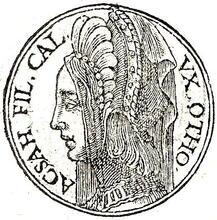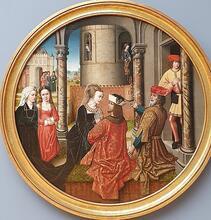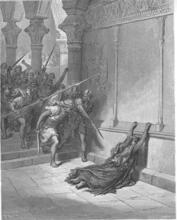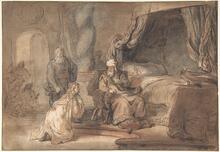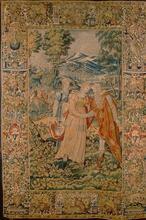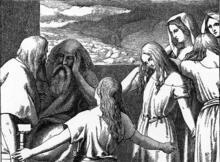Wife of Job: Midrash and Aggadah
"Job on the Ash Heap," by José de Ribera, c.1630. Via Wikimedia Commons.
Job’s wife is the subject of a moral critique by the midrash for advising her husband to commit blasphemy. Different midrashim account for the possible outcomes and motives of her actions. In one tradition, Job resists his wife’s advice; the rabbis drew a connection between Job’s wife and Eve, where Job learned from Adam’s mistakes in accepting his wife’s counsel. Other midrashic traditions address the identity of Job’s unnamed wife, with some rabbis identifying her as Jacob’s daughter Dinah, thus also addressing the question of the time of Job and his wife. In another midrash, Job was a non-Jew, and Dinah was married to him and converted him.
Lack of Success at Influencing Job
Job 2:9 relates that after all the disasters that befell Job and his family, his wife tells him that he should curse God for all that had happened to them. This blasphemy will result in Job’s immediate death, thus releasing him from his suffering. His wife’s counsel, which perhaps manifested her feelings of pity and compassion, only increases Job’s anguish at this nadir in his life, and makes it difficult for him to withstand this test. The wife is the subject of a moral critique by the A type of non-halakhic literary activitiy of the Rabbis for interpreting non-legal material according to special principles of interpretation (hermeneutical rules).midrash for the counsel that she gave her husband. In the view of the midrash, she acted in a fashion similar to Eve, who encouraged Adam to sin. Job, however, learned from the precedent of Adam, and did not heed his wife. He said: I am not like Adam. He listened to his wife, and sinned by eating of the Tree of Knowledge. But I did not heed my wife, I did not curse the Lord, and I did not sin. The midrash compares these two instances in which a wife tries to persuade her husband to consciously sin, and in each the wife’s power of persuasion is depicted as difficult to withstand. Job nonetheless resists this temptation and does not take his wife’s advice; to the contrary, he responds to her plan (Job 2:10): “Should we accept only good from God and not accept evil?” The midrash has Job telling his wife: Both of us must accept from God both the fine things and those that are not. He thereby indicated to her that, like him, she had to accept the evil from the Lord and justify divine judgment (Gen. Rabbah 19:12).
The Rabbis elaborate that when things go well with pagans they honor their gods, but when calamities come upon them, they curse them. Israel, in contrast, is not like that. If God bestows bounty on them, they give thanks; and if He inflicts suffering, then, too, they give thanks. Job says (1:21): “The Lord has given, and the Lord has taken away; blessed be the name of the Lord,” both for good and for evil. When his wife tells him (2:9): “You still keep your integrity! Blaspheme God and die!,” he responds: “You talk as any shameless woman might talk!,” that is, you talk like the Gentile women who curse their gods when suffering befalls them. But we, who act so finely in response to goodness, should we not act so in the face of our suffering? (Mekhilta de-Rabbi Ishmael, Masekhta de-Ba-Hodesh, Yitro 10). This midrash assumes that Job and his wife are Jews. The nationality of Job and his wife is not mentioned in the Book of Job and the Rabbis disagree on this question (see BT Bava Batra 15b). In contrast to the view that they both were Jews, another position maintains that Job was a Gentile; while yet a third view asserts that the wife was Jewish, while Job was a non-Jew who converted because of his wife (see below).
Success at Influencing Job
In another tradition, the wife does indeed influence her husband. After Job’s rejection of his wife’s advice, Scripture remarks (2:10): “For all that, Job said nothing sinful with his lips,” which the Rabbis understand as meaning: he did not sin with his lips, but he did transgress in his heart. They interpret Job’s following statements in this spirit, as alluding to his heresy against God. Thus, for example, Job says (9:24): “The earth is handed over to the wicked one,” thereby refuting God by asserting that the world is directed by the forces of evil, without Divine Providence. In 10:7 he says: “You know that I am not guilty, and that there is none to deliver from Your hand.” By saying this, Job attempts to free the entire world from divine judgment. He argues that whatever a person does is predetermined by God, and therefore he is not culpable for his actions. Job tells God: “Master of the Universe! You created the ox whose hooves are cloven, and it is permitted. You created the ass whose hooves are not cloven, and it is not permitted—you are the One who purifies and defiles. You created the Garden of Eden, you created Gehinnom. You created the righteous and You created the wicked. Since You created them as they are, the sinners are compelled to sin. Consequently, the sinner is not to be punished for his actions!” And in 7:9: “As a cloud fades away, so whoever goes down to Sheol does not come up.” With this statement Job denies the Resurrection of the Dead, for those who descend to Sheol will never ascend again, like an ephemeral cloud that does not return. According to this tradition, Job’s wife did indeed undermine her husband’s faith and led him to make such statements (BT Bava Batra 16a).
Other Midrashic Traditions
A late midrashic tradition casts Job’s wife in a more positive light. Job was blameless and upright, his wife was of similar good character, and she did not attempt to cause her husband to sin. Then why did she advise him, “Blaspheme God and die!”? Rather, after Job had lost all that he had—his ten sons and daughters, all his wealth and possessions—and after he had been inflicted with a severe case of boils, his wife tells him: You cannot bear all this suffering and distress, which will lead you to the loss of your faith. It would be better for you to pray to God that you die, so that you will depart from this world blameless, exemplary and righteous, and not come to sin (Midrash Iyyob 14, in Wertheimer, Batei Midrashot, vol. 2). According to this tradition, Job’s wife was aware of her husband’s exemplary character and merely sought to help him maintain his faith.
The midrashic account has Job marrying only a single wife. He expounded for himself the verse (Job 31:2): “What fate is decreed by God above? What lot, by Shaddai in the heights?” He told himself that if God had wanted to give Adam ten wives He would have done so, but He gave him only a single wife. One wife, who is my portion from the Lord, is also enough for me (Avot de-Rabbi Nathan [ed. Schechter], version B, chap. 2). Not only was Job monogamous; he was very strict with himself concerning other married women. He would not look even at an unmarried maiden, as is said (Job 31:1): “I have covenanted with my eyes not to gaze upon a maiden.” By strict law he could have gazed upon an unmarried woman, for if he liked her he could have married her, or given her in marriage to his brother or a friend. Job, however, would not permit himself this, and reasoned: If I were to look at her today, and tomorrow another man were to come and marry her, in consequence I would have gazed upon a married woman. If Job was so exacting regarding unmarried maidens, how much more so with married women (Avot de-Rabbi Nathan, version A, chap. 2).
The Bible does not mention the name of Job’s wife. Some Rabbis identify her with Jacob’s daughter Dinah, thus also addressing the question of the time of Job and his wife. The Biblical narrative lacks any historical allusions that could indicate the time of these events, which is the subject of a Rabbinic dispute. According to the view that identifies her with Dinah, Job would then have been a contemporary of Jacob (BT Bava Batra 15b). This midrash is based on the verbal similarity between two verses that portray the two women. Gen. 34:7 says of the rape of Dinah: “because he had committed an outrage [nevelah] in Israel”; and Job tells his wife (Job 2:10): “You talk as any shameless woman [ha-nevelot] might talk!” (Gen. Rabbah 19:12). The scholar Yizhak Heinemann understands this identification as meant to explain the wife’s bitter words, as resulting from the calamity that she had experienced while a maiden (Darkhei ha-Statements that are not Scripturally dependent and that pertain to ethics, traditions and actions of the Rabbis; the non-legal (non-halakhic) material of the Talmud.Aggdah [The Methodology of the Aggadah] [Givatayim, 1970], p. 17 [Hebrew]).
In another midrash, Job was a non-Jew, and Dinah was married to him and converted him. Jacob therefore had erred when he did not want to give her in marriage to his brother Esau, since she would have reformed him (Tanhuma [ed. Buber], Vayishlah 19). For additional midrashim on Jacob’s daughter Dinah, see Dinah.



